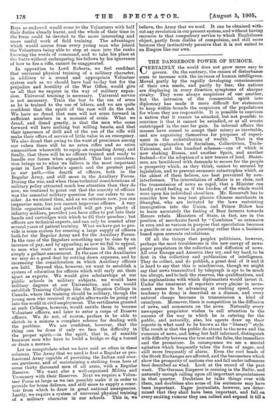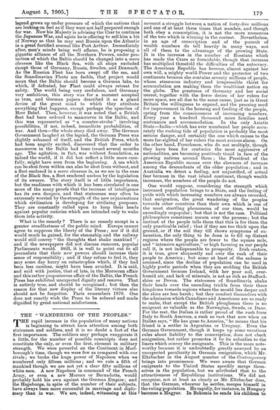THE DANGEROUS POWER OF RUMOUR.
CERTAINLY the world does not grow more easy to govern. On the contrary, the causes of disturbance seem to increase with the increase of human intelligence. Moved partly by the rapidly developing consciousness of their own needs, and partly by fear, the nations are displaying in every direction symptoms of sharper rivalry. They were always suspicious of one another, but the intrusion of the commercial spirit into diplomacy has made it more difficult for statesmen to keep within bounds the suspicions of the populations for whom they are responsible. It is possible to convince a nation that it cannot be attacked, but not possible to convince it that it cannot be swindled, or at all events outstripped in the race for gain. In internal affairs the masses have ceased to accept their misery as inevitable, and are organising themselves for purposes of experi- ment in the redistribution of wealth. That is the ultimate explanation of Socialism, Collectivism, Trade- Unionism, and the hundred schemes—one of which is now shaking Russia, and another Spain, and another Ireland—for the adoption of a new tenure of land. States- men are bewildered with demands to secure for the people a prosperity which, as they think, cannot be secured by legislation, and to prevent economic catastrophes which, as the ablest of them believe, are best prevented by non- interference. The interrelation of affairs is so close, and the transmission of news so rapid, that a Minister can hardly avoid feeling as if the burden of the whole world were upon his individual shoulders. Mr. Roosevelt has to consider how he may best placate Chinese merchants in Shanghai, who are irritated by the laws restricting immigration into the Union, and Prince Billow has to learn accurately the feeling of Boer farmers towards Herero rebels. Ministers of State, in fact, are in the position of merchants faced by " Combines " so extensive in area and so various in purpose that speculation becomes a gamble or an exercise in guessing rather than a business based upon accurate calculations.
Of all the things that perplex politicians, however, perhaps the most troublesome is the new energy of news- paper proprietors in the collection and diffusion of news. All over Europe and America they try, and try hard, to be first in the collection and publication of intelligence. They do collect, and do publish, a great deal of it and it is hard to say that this is mischievous, though we might say that news transmitted by telegraph is apt to be much too abrupt, and to lack the reserves, the qualifications, and the explanations with which diplomatists would invest it. Under the treatment of reporters every glacier in move- ment seems to be advancing at rushing speed, every tendency to decay is described as a disease, and every natural change becomes in transmission a kind of cataclysm. Moreover, there is competition in the diffusion of news, and comments on the news. Naturally every newspaper proprietor wishes to call attention to the success of the way in which he is catering for the public, and naturally, also, his agents draw up their reports in what used to be known as the " literary " style. The result is that the public do attend to the news and the rumours of news, and being but half informed, distinguish with difficulty between the true and the false, the immediate and the premature. In consequence we see a mental agitation which frequently takes the form of anger, and still more frequently of alarm. Even the cool heads of the Stock Exchanges are affected, and the barometers which show the prosperity of nations rise and fall under influences best described as wind. Look at the record of the past week. The German Emperor is cruising in the Baltic, and naturally enough calling upon all important acquaintances in that quarter. Doubtless he talks things over with them, and doubtless also some of his sentences may have been important. Eager journalists, however, are deter- mined that they shall have been important, and fall on every exciting rumour they can collect and expand it till a legend grows up under pressure of which the nations that are looking on feel as if they were not half prepared enough for war. Now his Majesty is advising the Czar to continue the Japanese War, and again he is offering to sell him a bit Cf Norway so that he may seat Russia upon the Atlantic in a great fortified arsenal like Port Arthur. Immediately after, men's minds being well aflame, he is proposing a gigantic alliance of all the Northern Powers, under pro- tection of which the Baltic should be changed into a mare elawsum like the Black Sea, with all ships excluded qxcept those of Germany, Russia, Sweden, and Denmark. As the Russian Fleet has been swept off the sea, and the Scandinavian Fleets are feeble, that project would Mean that the Baltic should become a German lake, to -which, if defeated, her Fleet could always retreat for safety. The world being very credulous, and Germany very ambitious, this story was for a moment accepted as true, and German papers described it as a grand device of the great mind to which they attribute everything that happens, except perhaps the speeches of Herr Bebel. Then, however, it was noted that a British fleet had been ordered to manceuvre in the Baltic, and this was represented as " a counter-stroke" involving possibilities, if not, indeed, immediate probabilities, of War. And then—the whole story died away. The German Government laughed at the legend, the German Press was slightly ashamed of itself, and the British Press, which had been angrily excited, discovered that the order to manceuvre in the Baltic had been issued several months ago. The agitation, in fact, was without foundation, as indeed the world, if it did but reflect a little more care- fully, might have seen from the beginning. A sea, which Can be shut from within can also be shut from without, and a fleet enclosed in a mare elausum is, as we see in the case of the Black Sea, a fleet rendered useless by the legislation of its owners. The story itself is of little importance, but the readiness with which it has been circulated is one more of the many proofs that the increase of intelligence has its own dangers, and that statesmen may often be extremely worried by the strength of the new organisations Which civilisation is developing for civilising purposes. They are constantly called upon to keep their heads against popular outcries which are intended only to wake them into activity.
• What is the remedy ? There is no remedy except in a greater steadfastness of the public mind. Europe cannot agree to suppress the liberty of the Press ; nor if it did would much be gained, for the steamship and the railway would still convey "the thoughts that shake mankind " ; and if the newspapers did not discuss rumours, popular Parliaments would. Still, it is well to point out to all journalists that their new powers should increase their sense of responsibility ; and if they refuse to feel it, they may some day hurry on catastrophes which, if they had been less careless, might have been avoided. It is said, and said with justice, that of late, in the Moroccan affair and this rather preposterous affair of the Baltic, the French press has exhibited unexpected dignity and reserve. That is entirely true, and should be recognised ; but then the reason for that new display of the literary virtues also Should not be forgotten. Paris remembers 1870. One does not exactly wish the Press to be sobered and made dignified by great national misfortunes.







































 Previous page
Previous page